
Полная версия
A Student's History of England, v. 1: B.C. 55-A.D. 1509
12. Cæsar's First Invasion. B.C. 55.—Accordingly, towards the end of August, Cæsar crossed the straits with about 10,000 men. There is some uncertainty about the place of his landing, but he probably first appeared off the spot at which Dover now stands, and then, being alarmed at the number of the Britons who had crowded to defend the coast, made his way by sea to the site of the modern Deal. There, too, his landing was opposed, but he managed to reach the shore with his army. He soon found, however, that the season was too advanced to enable him to accomplish anything. A storm having damaged his shipping and driven off the transports on which was embarked his cavalry, he returned to Gaul.
13. Cæsar's Second Invasion. B.C. 54—Cæsar had hitherto failed to strike terror into the Britons. In the following year he started in July, so as to have many weeks of fine weather before him, taking with him as many as 25,000 foot and 2,000 horse. After effecting a landing he pushed inland to the Kentish Stour, where he defeated the natives and captured one of their stockades. Good soldiers as the Romans were, they were never quite at home on the sea, and Cæsar was recalled to the coast by the news that the waves had dashed to pieces a large number of his ships. As soon as he had repaired the damage he resumed his march. His principal opponent was Cassivelaunus, the chief of the tribe of the Catuvellauni, who had subdued many of the neighbouring tribes, and whose stronghold was a stockade near the modern St. Albans. This chief and his followers harassed the march of the Romans with the rush of their chariots. If Cassivelaunus could have counted upon the continued support of all his warriors, he might perhaps have succeeded in forcing Cæsar to retreat, as the country was covered with wood and difficult to penetrate. Many of the tribes, however, which now served under him longed to free themselves from his rule. First, the Trinobantes and then four other tribes broke away from him and sought the protection of Cæsar. Cæsar, thus encouraged, dashed at his stockade and carried it by storm. Cassivelaunus abandoned the struggle, gave hostages to Cæsar, and promised to pay a yearly tribute. On this Cæsar returned to Gaul. Though the tribute was never paid, he had gained his object. He had sufficiently frightened the British tribes to make it unlikely that they would give him any annoyance in Gaul.
14. South-eastern Britain after Cæsar's Departure. B.C. 54—A.D. 43.—For nearly a century after Cæsar's departure Britain was left to itself. The Catuvellauni recovered the predominance which they had lost. Their chieftain, Cunobelin, the original of Shakspere's Cymbeline, is thought to have been a grandson of Cassivelaunus. He established his power over the Trinobantes as well as over his own people, and made Camulodunum, the modern Colchester, his headquarters. Other tribes submitted to him as they had submitted to his grandfather. The prosperity of the inhabitants of south-eastern Britain increased more rapidly than the prosperity of their ancestors had increased before Cæsar's invasion. Traders continued to flock over from Gaul, bringing with them a knowledge of the arts and refinements of civilised life, and those arts and refinements were far greater now that Gaul was under Roman rule than they had been when its Celtic tribes were still independent. Yet, in spite of the growth of trade, Britain was still a rude and barbarous country. Its exports were but cattle and hides, corn, slaves, and hunting dogs, together with a few dusky pearls.
15. The Roman Empire.—The Roman state was now a monarchy. The Emperor was the head of the army, as well as the head of the state. Though he was often a cruel oppressor of the wealthy personages who lived in Rome itself, and whose rivalry he feared, he, for the most part, sought to establish his power by giving justice to the provinces which had once been conquered by Rome, but were now admitted to share in the advantages of good government which the Empire had to give. One consequence of the conquest of nations by Rome was that there was now an end to cruel wars between hostile tribes. An army was stationed on the frontier of the Empire to defend it against barbarian attacks. In the interior the Roman peace, as it was called, prevailed, and there was hardly any need of soldiers to keep order and to maintain obedience.
16. The Invasion of Aulus Plautius. A.D. 43.—One question which each Emperor had to ask himself was whether he would attempt to enlarge the limits of the Empire or not. For a time each Emperor had resolved to be content with the frontier which Cæsar had left. There had consequently for many years been no thought of again invading Britain. At last the Emperor Claudius reversed this policy. There is reason to suppose that some of the British chiefs had made an attack upon the coasts of Gaul. However this may have been, Claudius in 43 sent Aulus Plautius against Togidumnus and Caratacus, the sons of Cunobelin, who were now ruling in their father's stead. Where one tribe has gained supremacy over others, it is always easy for a civilised power to gain allies amongst the tribes which have been subdued. Cæsar had overpowered Cassivelaunus by enlisting on his side the revolted Trinobantes, and Aulus Plautius now enlisted on his side the Regni, who dwelt in the present Sussex, and the Iceni, who dwelt in the present Norfolk and Suffolk. With their aid, Aulus Plautius, at the head of 40,000 men, defeated the sons of Cunobelin. Togidumnus was slain, and Caratacus driven into exile. The Romans then took possession of their lands, and, stepping into their place, established over the tribes chieftains who were now dependent on the Emperor instead of on Togidumnus and Caratacus. Claudius himself came for a brief visit to receive the congratulations of the army on the victory which his lieutenant had won. Aulus Plautius remained in Britain till 47. Before he left it the whole of the country to the south of a line drawn from the Wash to some point on the Severn had been subjugated. The mines of the Mendips and of the western peninsula were too tempting to be left unconquered, and it is probably their attraction which explains the extension of Roman power at so early a date over the hilly country in the west.
17. The Colony of Camulodunum.—In 47 Aulus Plautius was succeeded by Ostorius Scapula. He disarmed the tribes dwelling to the west of the Trent, whilst he attempted to establish the Roman authority more firmly over those whose territory lay to the east of that river. Amongst these later were the Iceni, who had been hitherto allowed to preserve their native government in dependence on the Roman power. The consequence was that they rose in arms. Ostorius overpowered them, and then sought to strengthen his hold upon the south-east of Britain by founding (51) a Roman colony at Camulodunum, which had formerly been the headquarters of Cunobelin. Roman settlers—for the most part discharged soldiers—established themselves in the new city, bringing with them all that belonged to Roman life with all its conveniences and luxuries. Roman temples, theatres, and baths quickly rose, and Ostorius might fairly expect that in Britain, as in Gaul, the native chiefs would learn to copy the easy life of the new citizens, and would settle their quarrels in Roman courts of law instead of taking arms on their own behalf.
18. The Conquests of Ostorius Scapula.—Ostorius, however, was soon involved in fresh troubles. Nothing is more difficult for a civilised power than to guard a frontier against barbarous tribes. Such tribes are accustomed to plunder one another, and they are quick to perceive that the order and peace which a civilised power establishes offers them a richer booty than is to be found elsewhere. The tribes beyond the line which Ostorius held were constantly breaking through to plunder the Roman territory, and he soon found that he must either allow the lands of Roman subjects to be plundered, or must carry war amongst the hostile tribes. He naturally chose the latter alternative, and the last years of his government were spent in wars with the Ordovices of Central Wales, and with the Silures of Southern Wales. The Silures were not only a most warlike people, but they were led by Caratacus, who had taken refuge with them after his defeat by Aulus Plautius in the east. The mountainous region which these two tribes defended made it difficult to subdue them, and though Caratacus was defeated (50), and ultimately captured and sent as a prisoner to Rome, Ostorius did not succeed in effectually mastering his hardy followers. The proof of his comparative failure lies in the fact that he established strong garrison towns along the frontier of the hilly region, which he would not have done unless he had considered it necessary to have a large number of soldiers ready to check any possible rising. At the northern end of the line was Deva (Chester), at the southern was Isca Silurum (Caerleon upon Usk) and in each of which was placed a whole legion, about 5,000 men. Between them was the smaller post of Uriconium, or more properly Viriconium (Wroxeter), the city of the Wrekin.
19. Government of Suetonius Paullinus. 58.—When Suetonius Paullinus arrived to take up the government, he resolved to complete the conquest of the west by an attack on Mona (Anglesey). In Mona was a sacred place of the Druids, who gave encouragement to the still independent Britons by their murderous sacrifices and their soothsayings. When Suetonius attempted to land (61), a rabble of women, waving torches and shrieking defiance, rushed to meet him on the shore. Behind them the Druids stood calling down on the intruders the vengeance of the gods. At first the soldiers were terrified and shrunk back. Then they recovered courage, and put to the sword or thrust into the flames the priests and their female rout. The Romans were tolerant of the religion of the peoples whom they subdued, but they could not put up with the continuance of a cruel superstition whose upholders preached resistance to the Roman government.
20. Boadicea's Insurrection. 61.—At the very moment of success Suetonius was recalled hurriedly to the east. Roman officers and traders had misused the power which had been given them by the valour of Roman soldiers. Might had been taken for right, and the natives were stripped of their lands and property at the caprice of the conquerors. Those of the natives to whom anything was left were called upon to pay a taxation far too heavy for their means. When money was not to be found to satisfy the tax-gatherer, a Roman usurer was always at hand to proffer the required sum at enormous interest, after which the unhappy borrower who accepted the proposal soon found himself unable to pay the debt, and was stripped of all that he possessed to satisfy the cravings of the lender. Those who resisted this oppression were treated as the meanest criminals. Boadicea, the widow of Prasutagus, who had been the chief of the Iceni, was publicly flogged, and her two daughters were subjected to the vilest outrage. She called upon the whole Celtic population of the east and south to rise against the foreign tyrants. Thousands answered to her call, and the angry host rushed to take vengeance upon the colonists of Camulodunum. The colonists had neglected to fortify their city, and the insurgents, bursting in, slew by the sword or by torture men and women alike. The massacre spread wherever Romans were to be found. A Roman legion hastening to the rescue was routed, and the small force of cavalry attached to it alone succeeded in making its escape. Every one of the foot soldiers was slaughtered on the spot. It is said that 70,000 Romans perished in the course of a few days.
21. The Vengeance of Suetonius.—Suetonius was no mean general, and he hastened back to the scene of destruction. He called on the commander of the legion at Isca Silurum to come to his help. Cowardice was rare in a Roman army, but this officer was so unnerved by terror that he refused to obey the orders of his general, and Suetonius had to march without him. He won a decisive victory at some unknown spot, probably not far from Camulodunum, and 80,000 Britons are reported to have been slain by the triumphant soldiery. Boadicea committed suicide by poison. The commander of the legion at Isca Silurum also put an end to his own life, in order to escape the punishment which he deserved. Suetonius had restored the Roman authority in Britain, but it was to his failure to control his subordinates that the insurrection had been due, and he was therefore promptly recalled by the Emperor Nero. From that time no more is heard of the injustice of the Roman government.
22. Agricola in Britain. 78—84.—Agricola, who arrived as governor in 78, took care to deal fairly with all sorts of men, and to make the natives thoroughly satisfied with his rule. He completed the conquest of the country afterwards known as Wales, and thereby pushed the western frontier of Roman Britain to the sea. Yet from the fact that he found it necessary still to leave garrisons at Deva and Isca Silurum, it may be gathered that the tribes occupying the hill country were not so thoroughly subdued as to cease to be dangerous. Although the idea entertained by Ostorius of making a frontier on land towards the west had thus been abandoned, it was still necessary to provide a frontier towards the north. Even before Agricola arrived it had been shown to be impossible to stop at the line between the Mersey and the Humber. Beyond that line was the territory of the Brigantes, who had for some time occupied the position which in the first years of the Roman conquest had been occupied by the Iceni—that is to say, they were in friendly dependence upon Rome, without being actually controlled by Roman authority. Before Agricola's coming disputes had arisen with them, and Roman soldiers had occupied their territory. Agricola finished the work of conquest. He now governed the whole of the country as far north as to the Solway and the Tyne, and he made Eboracum, the name of which changed in course of time into York, the centre of Roman power in the northern districts. A garrison was established there to watch for any danger which might come from the extreme north, as the garrisons of Deva and Isca Silurum watched for dangers which might come from the west.
23. Agricola's Conquests in the North.—Agricola thought that there would be no real peace unless the whole island was subdued. For seven years he carried on warfare with this object before him. He had comparatively little difficulty in reducing to obedience the country south of the narrow isthmus which separates the estuary of the Clyde from the estuary of the Forth. Before proceeding further he drew a line of forts across that isthmus to guard the conquered country from attack during his absence. He then made his way to the Tay, but he had not marched far up the valley of that river before he reached the edge of the Highlands. The Caledonians, as the Romans then called the inhabitants of those northern regions, were a savage race, and the mountains in the recesses of which they dwelt were rugged and inaccessible, offering but little means of support to a Roman army. In 84 the Caledonians, who, like all barbarians when they first come in contact with a civilised people, were ignorant of the strength of a disciplined army, came down from their fortresses in the mountains into the lower ground. A battle was fought near the Graupian Hill, which seems to have been situated at the junction of the Isla and the Tay. Agricola gained a complete victory, but he was unable to follow the fugitives into their narrow glens, and he contented himself with sending his fleet to circumnavigate the northern shores of the island, so as to mark out the limits of the land which he still hoped to conquer. Before the fleet returned, however, he was recalled by the Emperor Domitian. It has often been said that Domitian was jealous of his success; but it is possible that the Emperor really thought that the advantage to be gained by the conquest of rugged mountains would be more than counterbalanced by the losses which would certainly be incurred in consequence of the enormous difficulty of the task.
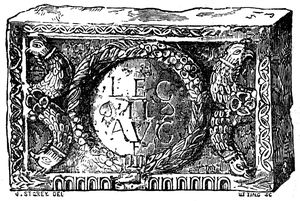
Commemorative tablet of the Second Legion found at Halton Chesters on the Roman Wall.
24. The Roman Walls.—Agricola, in addition to his line of forts between the Forth and the Clyde, had erected detached forts at the mouth of the valleys which issue from the Highlands, in order to hinder the Caledonians from plundering the lower country. In 119 the Emperor Hadrian visited Britain. He was more disposed to defend the Empire than to extend it, and though he did not abandon Agricola's forts, he also built further south a continuous stone wall between the Solway and the Tyne. This wall, which, together with an earthwork of earlier date, formed a far stronger line of defence than the more northern forts, was intended to serve as a second barrier to keep out the wild Caledonians if they succeeded in breaking through the first. At a later time a lieutenant of the Emperor, Antoninus Pius, who afterwards became Emperor himself, connected Agricola's forts between the Forth and Clyde by a continuous earthwork. In 208 the Emperor Severus arrived in Britain, and after strengthening still further the earthwork between the Forth and Clyde, he attempted to carry out the plans of Agricola by conquering the land of the Caledonians. Severus, however, failed as completely as Agricola had failed before him, and he died soon after his return to Eboracum.
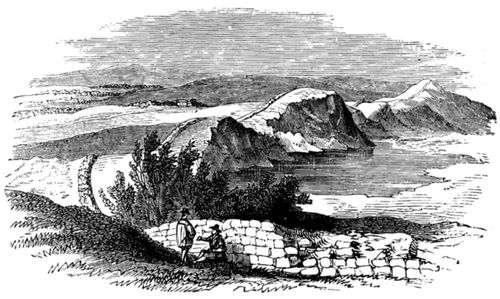
View of part of the Roman Wall.
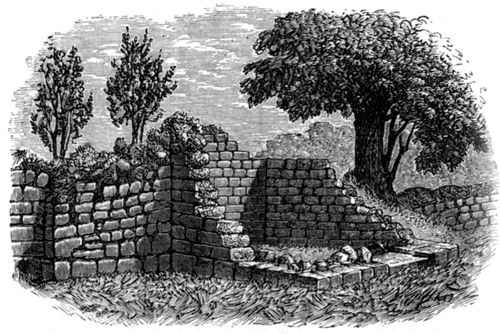
Ruins of a Turret on the Roman Wall.
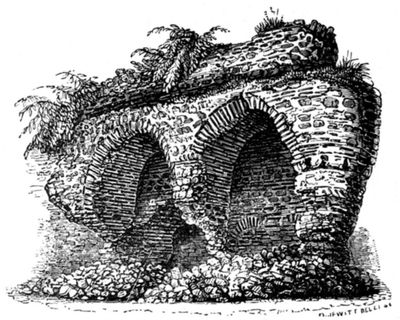
Part of the Roman Wall at Leicester.
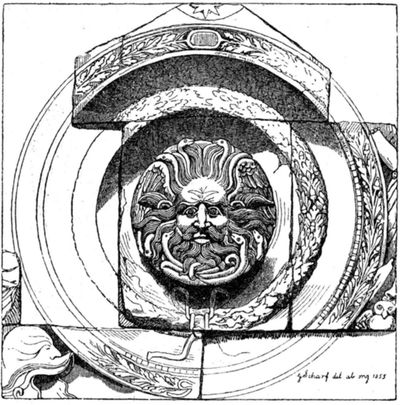
Pediment of a Roman temple found at Bath.
25. The Roman Province of Britain.—Very little is known of the history of the Roman province of Britain, except that it made considerable progress in civilisation. The Romans were great road-makers, and though their first object was to enable their soldiers to march easily from one part of the country to another, they thereby encouraged commercial intercourse. Forests were to some extent cleared away by the sides of the new roads, and fresh ground was thrown open to tillage. Mines were worked and country houses built, the remains of which are in some places still to be seen, and bear testimony to the increased well-being of a population which, excepting in the south-eastern part of the island, had at the arrival of the Romans been little removed from savagery. Cities sprang up in great numbers. Some of them were at first garrison towns, like Eboracum, Deva, and Isca Silurum. Others, like Verulamium, near the present St. Albans, occupied the sites of the old stockades once used as places of refuge by the Celts, or, like Lindum, on the top of the hill on which Lincoln Cathedral now stands, were placed in strongly defensible positions. Aquæ Sulis, the modern Bath, owes its existence to its warm medicinal springs. The chief port of commerce was Londinium, the modern London. Attempts which have been made to explain its name by the Celtic language have failed, and it is therefore possible that an inhabited post existed there even before the Celts arrived. Its importance was, however, owing to its position, and that importance was not of a kind to tell before a settled system of commercial intercourse sprang up. London was situated on the hill on which St. Paul's now stands. There first, after the Thames narrowed into a river, the merchant found close to the stream hard ground on which he could land his goods. The valley for some distance above and below it was then filled with a wide marsh or an expanse of water. An old track raised above the marsh crossed the river by a ford at Lambeth, but, as London grew in importance, a ferry was established where London Bridge now stands, and the Romans, in course of time, superseded the ferry by a bridge. It is, therefore, no wonder that the Roman roads both from the north and from the south converged upon London. Just as Eboracum was a fitting centre for military operations directed to the defence of the northern frontier, London was the fitting centre of a trade carried on with the Continent, and the place would increase in importance in proportion to the increase of that trade.
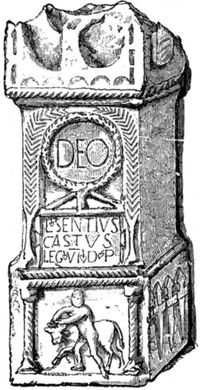
Roman altar from Rutchester.
26. Extinction of Tribal Antagonism.—The improvement of communications and the growth of trade and industry could not fail to influence the mind of the population. Wars between tribes, which before the coming of the Romans had been the main employment of the young and hardy, were now things of the past. The mutual hatred which had grown out of them had died away, and even the very names of Trinobantes and Brigantes were almost forgotten. Men who lived in the valley of the Severn came to look upon themselves as belonging to the same people as men who lived in the valleys of the Trent or the Thames. The active and enterprising young men were attracted to the cities, at first by the novelty of the luxurious habits in which they were taught to indulge, but afterwards because they were allowed to take part in the management of local business. In the time of the Emperor Caracalla, the son of Severus, every freeman born in the Empire was declared to be a Roman citizen, and long before that a large number of natives had been admitted to citizenship. In each district a council was formed of the wealthier and more prominent inhabitants, and this council had to provide for the building of temples, the holding of festivals, the erection of fortifications, and the laying out of streets. Justice was done between man and man according to the Roman law, which was the best law that the world had seen, and the higher Roman officials, who were appointed by the Emperor, took care that justice was done between city and city. No one therefore, wished to oppose the Roman government or to bring back the old times of barbarism.
27. Want of National Feeling.—Great as was the progress made, there was something still wanting. A people is never at its best unless those who compose it have some object for which they can sacrifice themselves, and for which, if necessary, they will die. The Briton had ceased to be called upon to die for his tribe, and he was not expected to die for Britain. Britain had become a more comfortable country to live in, but it was not the business of its own inhabitants to guard it. It was a mere part of the vast Roman Empire, and it was the duty of the Emperors to see that the frontier was safely kept. They were so much afraid lest any particular province should wish to set up for itself and to break away from the Empire, that they took care not to employ soldiers born in that province for its protection. They sent British recruits to guard the Danube or the Euphrates, and Gauls, Spaniards, or Africans to guard the wall between the Solway and the Tyne, and the entrenchment between the Forth and the Clyde. Britons, therefore, looked on their own defence as something to be done for them by the Emperors, not as something to be done by themselves. They lived on friendly terms with one another, but they had nothing of what we now call patriotism.
28. Carausius and Allectus. 288—296.—In 288 Carausius, with the help of some pirates, seized on the government of Britain and threw off the authority of the Emperor. He was succeeded by Allectus, yet neither Carausius nor Allectus thought of making himself the head of a British nation. They called themselves Emperors and ruled over Britain alone, merely because they could not get more to rule over.





